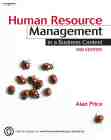
Employee Relations

 Employee Relations |
|

|
|
HRM Guide publishes articles and news releases about HR surveys, employment law, human resource research, HR books and careers that bridge the gap between theory and practice. |
 Human Resource Management in a Business Context, 3rd edition by Alan Price Human Resource Management in a Business Context provides an international focus on the theory and practice of people management. A thorough and comprehensive overview of all the key aspects of HRM, including articles from HRM Guide and other sources, key concepts, review questions and case studies for discussion and analysis. More information and prices from: Amazon.co.uk - British pounds Amazon.com - US dollars Amazon.ca - Canadian dollars Amazon.de - Euros Amazon.fr - Euros |
Employee relations - UK and Europe
|
|